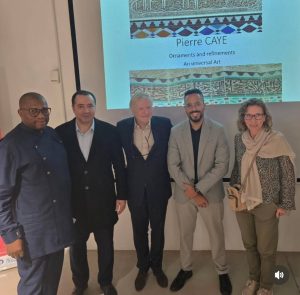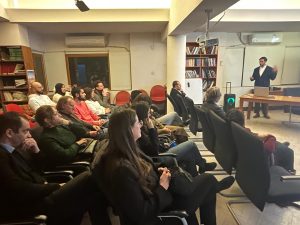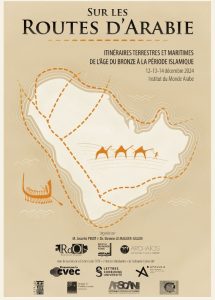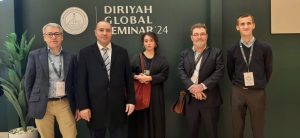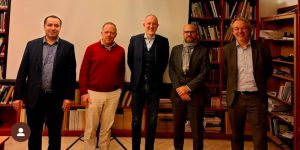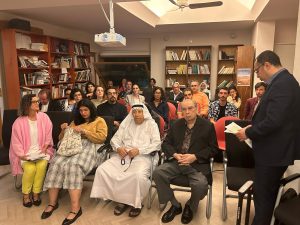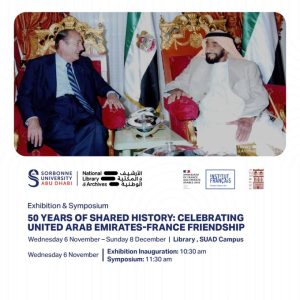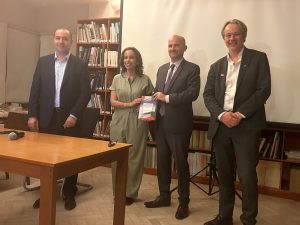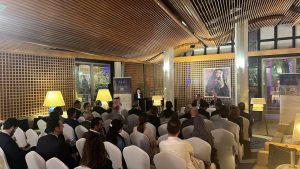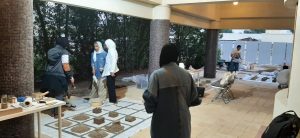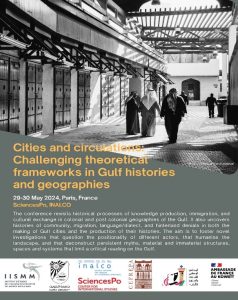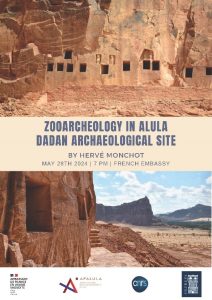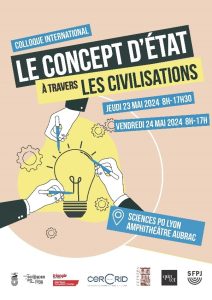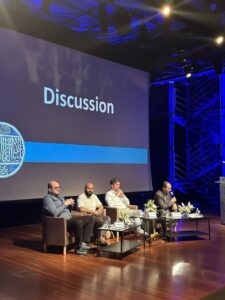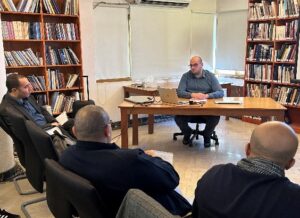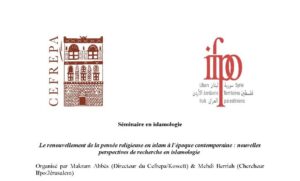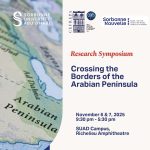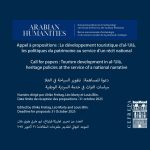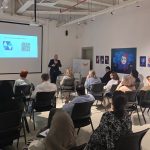Scientific Events
(Conferences, Workshops and Study Days)
CEFREPA had the pleasure to host the Director of the Institute of Islamic Studies and Director of the Jean Pepin Center for Research in Latin and Arabic Philosophy in Paris, Dr. Pierre Caye.
The tour included a visit to Kuwait, then Riyadh and Jeddah, where Dr. Pierre Caye gave two lectures. The first lecture in Kuwait was entitled “Thoughts on the Concept of Heritage” and the second in Jeddah was entitled “Ornament at the Service of Cultural Dialog” on the sidelines of the Islamic Arts Biennale currently being held there.
This visit was also an opportunity to meet many personalities from the academic world, many researchers and heads of scientific organizations and cultural institutions in Kuwait, Riyadh, and Jeddah. Most of the meetings resulted in cooperation projects that will be held in the near future with several parties, such as the conference scheduled to be held in 2026 with the House of Islamic Arts in Jeddah on the ornament.
Dr. Makram Abbes announced that another conference will be held in Kuwait in cooperation with Dar al-Athar al-Islamiyyah and the National Council next May. It will focus on new research at the global level in the field of studying ancient Arab thought.
CEFREPA hosted on January 29, 2025 a rich and captivating conference/Debate entitled: « La nostalgie est-elle le nouveau pétrole du monde arabe? » with Sofiane Si Merabet in presence of the Ambassador of France in Kuwait Mr. Olivier Gauvin.
Nostalgia is often described as a feeling frozen in time, or even a curse. At a time when many questions emerge around the definition of Arab identities, this feeling appears more and more as a socio-cultural trait present and claimed in the cultures of the countries of the Arab world. Migration as well as recent political conflicts have helped to spread the idea that “it was better before”. How to define this “Arab nostalgia”? Through the concept of “future of nostalgia applied to Arab regions, Sofiane Si Merabet discussed how history and culture can be, and already are, drivers of development for certain countries.
Sofiane Si Merabet is an artist and cultural entrepreneur living and working in Dubai. A polyglot traveler, he has participated for many years in projects linked to plural identities. Through his Instagram account @theconfusedarab, he explores the concept of “future of nostalgia”, as well as the question of identities and memories in the Arab world and its diaspora. He recently published in 2024, an essay The Confused Arab (Belfond edition) addressing contemporary Arab identities in both a personal and documented manner.
An international conference entitled “On the Roads of Arabia. Itinirary by land and sea” has been held on 12-13-14 December 2024 at Institut du Monde Arabe (IMA), Paris and was organized by Routes de l’Orient, l’Institut du monde arabe & ARCHAÏOS in partnership with CEFREPA, AFALULA, ARSCAN, CVEC, Sorbonne university, Ecole doctorale 22 and Orient & Mediterranée.
Organized by Sterenn Le Maguer-Gillon (Unil/Archaïos/Cefrepa) and Joesselin Pinot (Paris 1 Panthéon Sorbonne/Archaïos), this magnificent international conference brought together some excellent specialists who, over the course of three days, addressed the following topics: 1. structures inherent to land and sea routes; 2. actors involved in the circulation of the Arabian Peninsula and its periphery; 3. trade and merchant networks; 4. circulation of goods, materials and techniques; 5. pilgrimage routes in the Islamic period; 6. maritime routes and resources.
The French Research Center of the Arabian Peninsula, represented by its director Dr. Makram Abbes and four associated researchers, Dr. Philippe Pétriat (Paris1-Panthéon Sorbonne), Dr. Stephen McPhilipps (CNRS), Dr. Jérémie Schiettecatte (CNRS) and Camille Bougault (Phd student) participated on December 8 and 9, 2024, in the Diriyah International Global Seminar, where several discussions and lectures were held and an elite group of experts and researchers gathered to review the legacy of Diriyah and the central region, which made them a center for cultural and commercial exchange throughout the ages. The CEFREPA’ s panel addressed the topic “Globalizing Markets of Dirriyah and Central Arabia”.
The CEFREPA hosted on November 27, 2024 a rich and captivating conference/Debate entitled: «Islam in Europe: complex conversations with secularization and institutions» with Dr. Michael Privot in presence of the Ambassador of France in Kuwait Mr. Olivier Gauvin.
The increasing presence in Europe, specifically in North-West Europe, over the last 60 years have brought up many challenging questions for both Muslim communities and their leaders as well as for institutions, from the local to the European levels, on how to apprehend this complex, multilayered and decentralized phenomenon. Whereas Muslims have repeatedly expressed strong concerns about the negative impacts of modernity and secularization on Islam, the very growth of Islam, its profusion of trends and varieties, its “liquidity” in adapting to 27 different national contexts is specifically linked to the high level compatibility of its DNA with secularization/secularism. The conference discussed how to bring interesting insights in this complexity through the eyes of one committed participant to this adventure.
Dr. Michaël Privot is a trained scholar in the field of Islamic Studies, from the University of Liège (Belgium), where he serves as scientific collaborator at the Center for the Study of Ethnicity and Migration (CEDEM). His doctoral researches were articulating the fields of philology, codicology, Islamic classical philosophy and tasawwuf. He later explored issues linked to identities of European Muslims, liberal theology and radicalization. He is recognized as a voice that matters in Belgium and European Islam. He has authored a number of books and papers, including on Imamate in Europe. He currently serves as Board Member of the Muslim Council of Belgium, the official representative body of the Muslim cult in Belgium. In his daily life, Michael is a consultant in D&I as well as public diplomacy.
The French Research Center of the Arabian Peninsula (CEFREPA) organized a presentation entitled “Screening and presentation of the documentary film Monumenting” with Dr. Anahi Alviso-Marino on November 19, 2024.
This session was dedicated to the screening of Monumenting (in-progress). As monuments continue to be toppled, relocated and reassessed all over the world, this documentary took us to Kuwait City, Dubai, Abu Dhabi and Sanaa, questioning what a monument is and asking what a monument could be. Following the screening, Anahi Alviso-Marino, Deema Alghunaim, Lolwa AlKandari and Zahra Almahdi talked about the film, the research journey of its making and playing as research.
A captivating exhibition from November 6, 2024 to December 8, 2024 proposed by H.E. Nicolas Niemtchinow, Ambassador of France to the UAE, in collaboration with the French Institute in the UAE and the National Library and Archives and CEFREPA took place in SUAD campus. This exhibition showcased a rich array of both French and Emirati archives, illustrating the exceptional partnership that has developed over many years, long before the opening of the first French embassy in 1974.
A symposium titled “Food cultures in the Arabian Peninsula between traditions, innovations and challenges” took place on November 4-5, 2024 at Sorbonne University Abu Dhabi in partnership with CEFREPA, Sorbonne University & Sorbonne University-Abu Dhabi.
The aim of this symposium was to explore food cultures in the Arabian Peninsula over an extended historical period using a multidisciplinary approach, with the goal of highlighting transformations and current challenges, particularly regarding public health, and to propose potential solutions.
This event marked the launch of the Sorbonne Université Alliance’s multidisciplinary “Food” Initiative, which brings together around forty colleagues from Sorbonne Université’s three faculties (Humanities, Sciences and Engineering, Health), the Musée National d’Histoire Naturelle (MNHN), CELSA, INSEAD, and INSPE.
The symposium also seeks to foster connections with local scholars by inviting them to participate in the call for papers, discussions, and roundtables, with the aim of establishing long-term partnerships, developing a structured network, and promoting international mobility for both faculty and researchers, as well as doctoral students.
Lastly, the event included an “open science” component to share research with the general public through two dedicated outreach events.
CEFREPA had the pleasure of organizing a conference dedicated to the presentation of the book by Dr. Nour Al Habshi: “Kuwaiti-French relations: origin and evolution (1778-1991)” in the presence of His Excellency the Ambassador of France in Kuwait Mr. Olivier Gauvin.
Dedicated to the presentation of the book:”Kuwaiti-French relations: origin and evolution (1778-1991)” recently published by Dar That Al Salasil, the conference analyzes the content of this work, considered the first of its kind in the field of study of relations between Kuwait and France.
This work is based on unpublished archives on which the author worked during her stay in Paris in early 2024, and represents the first scientific effort dedicated to writing the history of relations between the two countries from the 18th century until at the end of the 20th century, thanks to the analysis of several sources written in French, Arabic and English.
Dr. Nour Al-Habshi is a professor in the Department of History and Archeology, Faculty of Letters, Kuwait University. She received the State Encouragement Prize in the field of historical and archaeological studies and popular traditions of the State of Kuwait for the year 2021, on the occasion of the publication of her book “Kuwaiti-American relations: their origins and development (1868-1991)”. She is a member of the Society of History and Antiquities of the Gulf Cooperation Council Countries, as well as the Union of Arab Historians. She has participated in several scientific events, and published numerous articles and works in Arabic and English.
A conference tilted: « Parcours d’un anthropologue français au Yémen» by Franck Mermier, anthropologist, research director at CNRS was organized by the Embassy of France in Yemen and the CEFREPA on October 23, 2024 in Riyadh, Saudi Arabia.
This conference traced the professional career of Dr. Franck MERMIER in Yemen between the early 1980s and the 2000s. This retrospective look aimed to combine the evocation of personal experiences with the crucial historical events that Yemen experienced during this period. The eleven years spent in Yemen, divided into different stays, allowed him to live in Taez and Sanaa and to travel to different regions of the country, notably Aden. The evocation of these experiences were an opportunity to share certain reflections on Yemeni society and on the recent history of Yemen which were concluded with some observations on the current situation, particularly on the cultural field in the broad sense.
Dr. Franck MERMIER is a specialist in anthropology and the study of societies of the Arabian Peninsula and the Arab East. He held the position of Director of the French Center for Yemeni Studies from 1991 to 1997, in Sanaa. He has also published several works on Lebanon and Yemen, some of which have been translated into Arabic and have become essential references in the fields of studies devoted to urban life, political anthropology and the cultural productions of these countries. He published, among others, Le sheikh de la nuit. Sanaa: organization of souks and urban society (1997) and Stories of cities: from Aden to Sanaa (2015) and co-directed Contemporary Yemen (1999) and Yemen. The revolutionary turning point (2012) as well as Yemen. Writing War (2018).
CEFREPA was pleased to host a Workshop on October 10, 11 and 12 entitled: “Exploring Earth as a Building Material”. We extend our warmest thanks to Zahra Ali Baba, her colleagues at the NCCAL and to all the participants for these days of raising awareness of the interest in safeguarding ancient construction techniques, and their role in the preservation of heritage and national identity.
Conference organized by Kuwait University, INALCO, NCCL, Sciences Po, the French Embassy in Kuwait and CEFREPA. As an extension of the Workshop organized on November 19 in Kuwait City, it deepens the scientific collaboration between the two countries in SHS.
The conference revisited historical processes of knowledge production, immigration, and cultural exchange in colonial and post-colonial geographies of the Gulf. It also uncovered histories of community, migration, language/dialect, and hinterland denials in both the making of Gulf cities and the production of their histories. The aim was to foster novel investigations that question the positionality of different actors, that humanize the landscape, and that deconstruct persistent myths, material and immaterial structures, spaces and systems that limit a critical reading on the Gulf.
The French Research Center of the Arabian Peninsula (CEFREPA) in partnership with The French embassy in Saudi Arabia, AFALULA & CNRS organized a conference-Debate entitled: :”Zooarcheology in AlUla Dadan archaeological site” on May 28, 2024 at the French embassy at Riyadh, Saudi Arabia.
The city of Dadan was the capital of important Iron Age regional powers. The kingdoms of Dadan and Lihyan controlled the caravan routes between the Levant and Mesopotamia. The popularized presentation will focus on archaeolozoology applied to the Dadan site as a means of reconstructing and understanding the subsistence strategies and lifestyles of the Oasis’ inhabitants over the last three millennia
The French Research Center of the Arabian Peninsula (CEFREPA) in partnership with Sciences Po Lyon & le laboratoire Triangle, UMR 5206 organized a workshop entitled “Le concept d’Etat à travers les civilisations” on May 23-24, 2024 at Sciences Po, Lyon.
Several researchers associated with CEFREPA participated in the International Symposium at Dar al-Athar al-Islamiyyah, Kuwait city on March 5, 6 and 7, 2024.
Panelists discussed different topics:
Eric Vallet (University of Strasbourg), “Words of Factionalism in Yemen (7th-9th/13th-15th centuries): Text mining into the Rasulid historiographical corpus”
Mehdi Berriah (Institut français du Proche-Orient), “References to early Islam in Mamluk jihad propaganda and the construction of the image of the mujāhid sultan”
Hassan Bouali (The French Research Centre of the Arabian Peninsula), “The Transmission of Early Islamic Knowledge and the Praise of Mecca during the Mamelouk Era : The case of Muḥibb al-Dīn al-Ṭabarī (d. 694/1295)”
Makram Abbès (The French Research Centre of the Arabian Peninsula), “Fâkihat al-Khulafâ’ by Ibn ‘Arabshâh: A mirror of princes from the Mamluk period”
The French Research Center of the Arabian Peninsula (CEFREPA) organized a workshop entitled “Paix et diplomatie à l’âge classique de l’Islam” on March 3, 2024 with the participation of Makram Abbès (Cefrepa), Mehdi Berriah (Ifpo), Hassan Bouali (chercheur associé Cefrepa) and Hassan Chahdi (Université de Lorraine).
Bringing together historians, Islamologists and other specialists in Islam, this workshop aimed to be a contribution to the field of studies on peace in Islam which remains little explored and which offers numerous research perspectives. Resolutely multidisciplinary, the workshop aimed to study peace as an Islamic concept but also as a phenomenon in multiple dimensions that must be included in a context and its developments.
A new monthly seminar has recently been set up by Makram Abbes (Director du Cefrepa/Koweït) & Mehdi Berriah (Researcher Ifpo/Jérusalem).
This seminar aims to publicize the work of researchers in Islamic studies who, through their themes and approaches, contribute to the renewal of the field of study on Muslim thought from a perspective that is both diachronic (study of the doctrines of the past) and synchronic (theoretical positioning in relation to the writings of contemporary scholars). Organized by two Umifre-s (CEFREPA and IFPO) which cover 12 Arab countries, the seminar also aims to identify the voices of renewal of readings and interpretations, to make them known to the French and Western public, and to engage in a fruitful dialogue on common objects of study.
See the complete program: https://cefrepa.cnrs.fr/2024/01/15/le-renouvellement-de-la-pensee-religieuse-en-islam-a-lepoque-contemporaine-nouvelles-perspectives-de-recherche-en-islamologie/
Particular interest was paid to new theorizations of theological-religious concepts, to the analysis of the construction or deconstruction of the sacred as well as to specific questions which have been the subject of debate for several decades now (relationship between politic/religion, secularism, human rights, war and peace, veil, halal, etc.).
Many specialists working in Western or Arab-Muslim contexts were called upon to intervene on these subjects, as the issues addressed today have a global dimension, due to major mutations and global upheavals of a political, economic or technological nature which have affected Muslim societies and Muslim minorities in the West. These situations have led scholars and intellectuals to question their destiny, and to propose new approaches to the classical Islamic corpus in the light of today’s context, by increasingly integrating new tools from the human and social sciences. Various recent works relating to the founding texts as well as the facts of religion and society have sparked – and still spark – a number of debates, thus contributing to the renewal of contemporary Muslim thought. By making them known through this seminar and the exchanges it will generate, the public is able to glimpse new perspectives of research in the field of Muslim thought, and closely follow the intellectual dynamics at work in the different academic circles of the East and the West.
The CEFREPA in collaboration with INALCO & Kuwait University organized a conference entitled “Music and songs in Kuwait: Journey into the heart of Arab cultural heritage”. This conference took place at INALCO – Auditorium Georges Dumézil 2 rue de Lille on 15 December 2023.
The symposium presented the main axes of research on Kuwaiti music. It studied Kuwaiti music from an anthropologic, musicological, and ethnolinguistic point of view. It especially focused on the relationships between Kuwaiti music and the main social evolutions that occurred in Kuwait during the 20th century. How Kuwaiti songs reflected the development of the Kuwaiti society? How can we study sung poetry in Kuwait, the text of the songs, from a linguistic point of view? How the tension between “ancient” and “modern” formed at linguistic and musical levels? What are the main contact phenomena between Kuwaiti music and the others Arabic countries, especially those of the Arabian Peninsula? How this precious immaterial heritage can contribute to a better knowledge of the Arabic language and culture?
The French Research Center of the Arabian Peninsula (CEFREPA) organized a workshop entitled “Monument Exchanges / Kuwait City” with Dr. Anahi Alviso-Marino on November 21, 2023 at CEFREPA.
This workshop was dedicated to generating collective knowledge about the city and public art through retracing stories about monuments and sculptural artworks in Kuwait City’s parks, roads, and roundabouts.
The participants worked with both maps and monuments—the latter understood as sculptural and architectural works created to commemorate events, generate landmarks, celebrate individual and collective figures, and/or embellish the city.
The CEFREPA in collaboration with Kuwait University, Inalco, NCCL & Sciences Po organized a workshop entitled “Cities and circulations: Challenging theoretical frameworks in Gulf histories and geographies”. A working meeting followed by scientific sessions took place in Kuwait on 19 November 2023. This workshop will be followed by three-day conference on 29-31 May 2024 in Paris.
The closed working meeting was followed by a public scientific session with relevant stakeholders to describe the themes and goals of the workshop and the broader mission of building an interdisciplinary network of Gulf scholars that breaks academic, institutional, and research silos. The outcomes of the working meeting and scientific sessions in Kuwait will inform the three-day event in Paris that brings together dedicated Gulf scholars around the six broad themes.
The CEFREPA organized an International conference on “October 1973-October 2023. Fifty Years after the Oil Crisis”, followed by an original exhibition which retrace an important part of the contemporary history of the Middle East and the rest of the world from a local and global perspective.
Fifty years ago, the oil ministers of the OPEC Gulf States met in Kuwait to make a series of decisions which led to outcomes that are still shaping our world today.
On 16 October 1973, they decided to increase oil prices, thereby taking back the power of setting these prices from the American and European oil companies that were still exploiting the region’s oil fields.
On 17 October 1973, in response to the October War, the ministers of the Arab countries implemented an embargo on oil intended for countries allied to Israel.
Beyond its economic and geopolitical origins, this event was to have far-reaching consequences for the societies of the Gulf, which were modernizing at great speed, and would become after 50 years the nerve center of the Arab world and the major global players in the fields of energy and finance, as well as heritage and urban planning.
These scientific events shed light on the many discussions that surrounded the measures taken in Kuwait and their consequences for the development of the Gulf States. Bringing together key witnesses to the events of October 1973 and academic experts, they focus in particular on the economic, social and cultural effects of these decisions in the countries of the Middle East, and the way in which these decisions ushered in a new form of globalization that we are still experiencing today.
CEFREPA was present on the occasion of the holding of the Alula World Archeology Summit on September 14, 2023. Bringing together numerous specialists in archeology and heritage preservation, this World Summit constituted a strong moment of exchange and dialogue between researchers, experts and decision-makers around the crucial questions of knowledge of the past and its valorization.
In addition to many researchers associated with CEFREPA who were present during the Summit, the Director, Makram ABBES, participated in a panel entitled “Cross-pollination: How Can Archeology Support Interdisciplinary Innovation?”
Organized in partnership with Kuwait University (Department of Philosophy) on April 30 and May 1, 2023, the conference on “Citizenship in the Arab world” explores the concept of citizenship both in its individual and collective dimensions, as well as at the level of the political and legal practices it underlies. It also aimed to evaluate the experiences that Arab countries have had in this area in the 20th century and beyond, and puts into perspective the connections that these recent experiences have with, on the one hand, classical Arab political thought and, on the other hand, classical Arab political thought. On the other hand, European influences, notably the ideals of the Enlightenment and the Declaration of the Rights of Man and of the Citizen after the French Revolution.
Eminent researchers from several universities and well recognized in their fields of expertise were present at this international event to address these fascinating themes and present their point of view to an audience interested in the subject. The conference was organized over two days: the first took place at Kuwait University and brought together philosophers, political scientists and sociologists specializing in these themes. The second, which was held at CEFREPA, undertook a dialogue with Kuwaiti civil society actors, and reflected on ways to extend academic work on the subject through publications and subsequent events.
The French Center for Research in the Arabian Peninsula (CEFREPA) recently celebrated its 40th anniversary in the region, under the patronage of the French Ambassador H.E. Claire Le Flecher, and in the presence of several diplomats and academics.
The ceremony highlighted the center’s research into the ancient history of Kuwait, and the discoveries it made in this regard over the past many decades. During a press conference held on the occasion, Director of CEFREPA, Dr. Makram Abbas stated, “We are celebrating the 40th anniversary of our center, which was founded in Sana’a in 1982 by the famous French archaeologist Christian Robin.”
Presentation of the book “Global History of Kuwait” published in three languages in cooperation with the National Council for Culture, Arts and Letters and written by two French researchers Julie Boneric and Philippe Petriat who are associated with the French Research Center in the Arabian Peninsula CEFREPA.
.
Insaniyyat an international Humanities and Social Sciences Forum was be held in Tunis (September 20 to 24), bringing together more than 1300 researchers, academics and artists from 35 countries from the Maghrib, the Middle East, Europe and Africa, and almost all other parts of the world.
Its three main objectives were : to provide a space for conversations between different academic traditions on current research and issues in the humanities and social sciences; to promote exchanges between academics, young researchers and artists from different linguistic spheres and cultures; and to defend the place of the humanities and social sciences in public life.
Kuwait witnessed an unprecedented cultural event, as the French Center for Research on the Arabian Peninsula (CEFREPA) organized an exhibition titled “France and Kuwait, a friendship of more than two centuries” under the direction of the director of the Center, Dr. Makram Abbas.
The exhibition aimed to explore available documents and previously unpublished archives in order to show the depth of relations between the two countries, and to stimulate interest in studying and knowing them better.
The exhibition highlighted an enduring friendship that unfolds in several contexts and domains, encompassing not only political-military contacts (the Kuwait incident, the Gulf War), but also cultural influences (the art of fine jewelry; joint artistic exhibitions), scientific collaborations (archaeological excavations) or economic relations (the pearl trade). These different dimensions which were at the origin of numerous exchanges between the two countries were illustrated by panels in three languages (French, Arabic and English) and by archive documents of different kinds (maps, texts, photographs, paintings or videos) which show the existence of a shared memory around strong moments and historical links which have been tainted by neither disorder nor conflict.
The French Research Center of the Arabian Peninsula (CEFREPA) organized two conferences with Cédric BAYLOCQ, the first: “From Islam in France to French Islam? A short social history and contemporary issues in the relations of the secular state with Muslims”, which was held on May 25, 2022 in English at the Kuwaiti Writers’ Association and the second: “Addressing the controversies on Islam in France in a Muslim context: some practical cases” which was held on May 26, 2022 in French at CEFREPA.
Dr. Cedric BAYLOCQ holds a doctorate in anthropology from the University of Bordeaux in France, is a professor at the Catholic Institute of Paris and a member of the French Research Center of the Institute of Political Studies of Bordeaux. He was appointed to several special administrative positions in the French Ministry of the Interior to support social research on contemporary Islam and Islamic studies in general. Then he obtained the position of advisor to the French Ministry of Foreign Affairs for North African and Middle Eastern affairs. Dr. BAYLOCQ is primarily interested in issues of Islam in France or French Islam and studies issues related to secularism, religious bodies in Islam, contemporary Islamic thought, Islamic movements and other relevant topics of its area of expertise. The conference addressed several points, including the long history of historical relations between France and Islam, distinguished Muslim personalities in France and the emergence of a new page in the dialogue between the State and Muslims since 2015.
On the occasion of the 60th anniversary of Franco-Kuwaiti friendship, the French Research Center for the Arabian Peninsula (CEFREPA) invited Jean-Pierre Filiu to speak about the French contribution to the liberation of Kuwait in 1991. The conference was held on May 17, 2022 in the amphitheater of the National Library of Kuwait.
Dr. Makram Abbas, Director of CEFREPA, welcomed all participants and introduced Jean-Pierre Filiu, Professor of Middle Eastern Studies at the Institute of International Affairs in Paris. Jean-Pierre Filiu has been a visiting professor at Columbia and Georgetown Universities, and his books, written in French or English, have been translated into more than fifteen languages, including Arabic. He has written more than twenty books on Arab countries, their political systems, the 2011 revolutions that shook the region and the issue of violence and human rights. He was a diplomat for two decades and actively participated in the French contribution to the liberation of Kuwait from Iraqi occupation in 1991.
The conference addressed the French position on the invasion of Kuwait, emphasizing in particular that France had a strategic vision of the conflicts in the region very different from the American vision. Despite this, France was part of the coalition and contributed to the liberation of Kuwait through Operation Daguet in February 1991. Professor Filiu told the audience his memories as a diplomat and specialist in historical and geopolitical analysis, combining thus his personal and academic experience in his presentation of this important episode in the study of the history of the two countries.





